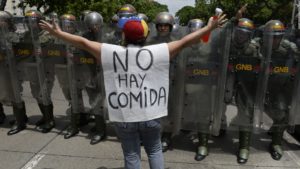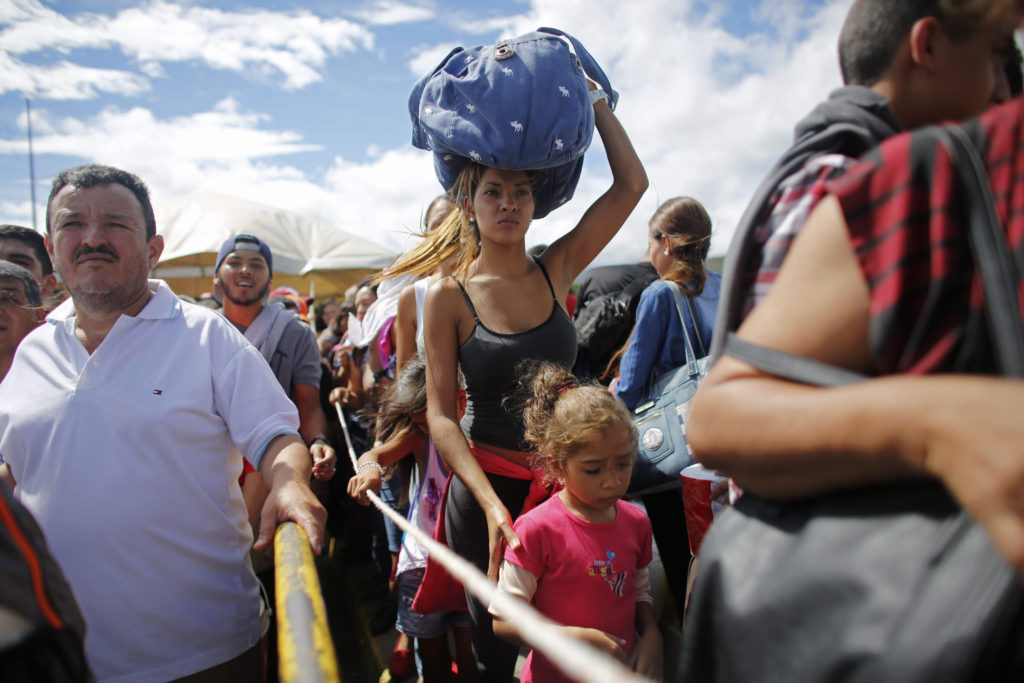Tired of the constant state of crisis, increasing numbers of Venezuelans are fleeing their homeland
This is the 2nd installment of MiKo’s coverage of Venezuela’s economic crisis.
As it stands today, Colombia’s official policy toward Venezuelan migrants is one of identification and integration – and not simply feeding hungry people as they cross the border.
“There are problems in Venezuela, there are problems of hunger. It’s one of the principal causes (of the migration),” director general of Colombia’s Migration office, Christian Krüger Sarmiento, told an audience during La Silla Vacia’s debate show ‘Sí o No‘. “One of the biggest questions is, should we strengthen the migration policies, or ease them? Easing (border controls) is not the same as giving (migrants) food.”
He continued: “The solution is not to give them food, because if you do that, you’ll have to do that indefinitely. The aim of the migration policies is to incorporate parts of (the migrant) population into the country, to help them become productive members of society. And that’s what we’ve been doing.”
So what if the flow of refugees reaches the point where integration is no longer a viable option?
“We have prepared contingency plans so that if the worst scenario occurs, we know how to respond,” Juan Carlos Restrepo of the President’s office told the website La Silla Santandereana on August 10. Restrepo did not, however, give any details about what that contingency plan might look like.
Health Care Services Under Strain
Venezuela’s economic crisis, and the rising number of migrants it has triggered, has placed a heavy burden on health services in cities and towns in Norte de Santander, Arauca, La Guajira and Guainía provinces. The Erasmo Meoz Hospital in the border town of Cucuta, for example, has seen patients of Venezuelan origin skyrocket in recent months. “Venezuelan patients used to be very rare,” Diego Celis, a pediatrician at the hospital, told Vice News earlier this year. “Nowadays we see 20, 30 that come in for consultations on any given day.”
From August 2015 to July 2016, the hospital had 5,300 Venezuelans in for emergency room visits, with a cost close to 6 billion pesos ($2 million USD), a cost the hospital has had to absorb, as almost none of Venezuelan patients have health insurance.
What Venezuela’s Refugee Crisis Means for Colombia (Part 1)
Hospitals in other provinces have also felt the pinch, so much so that it has affected their ability to treat sick and injured Colombians. These hospitals have appealed to the national government for more funding, prompting the Ministry of Health in May this year to issue an order to cover the added expenses. But, in true Colombian fashion, red tape and complex paperwork have prevented hospitals from getting the funds they so sorely need.
“So far we have not been given a single peso,” Juan Augusto Ramírez, director of Erasmo Meoz Hospital in Cucuta, told Semana news magazine earlier this month.
Anti-Venezuelan Sentiment on the Rise
Not everyone in Colombia is welcoming the influx of Venezuelans with open arms. Some are openly resentful of their presence, arguing that they are taking away already limited work opportunities from Colombians. When one MiKo contributor broached the subject with a friend, that person said flatly: “I don’t want my country full of Venezuelans.”
Jonathan Sánchez, a Venezuelan who sells candy, pens and other items on Bogota’s TransMilenio system to survive, spoke of the hostility he sometimes faces from passengers, many of whom say he should go back from where he came. “Those comments are common,” he told a reporter. “Many people frown when they hear the accent. [They say] ‘Oh, another!’ A man who heard my accent said ‘Venezuelan? Go back to your country!’ It’s a matter of tremendous xenophobia.”
In cases like these, Colombians are forgetting their history – when Venezuela took in hundreds of thousands of Colombians during the Bad Old Days. Not that long ago, the trend was the other way around. As many as 4 million Colombians poured into Venezuela at a time when their own nation was engulfed in an armed conflict between the guerrillas, paramilitaries, drug cartels and the army, and while Venezuela’s oil-rich economy was booming. But now that the current is flowing in the other direction, many on this side of the border are not willing to roll out the ‘Welcome’ mat.

A woman wearing a sign that reads ‘There is no food’ stands up to a line of riot police during an anti-government protest in Caracas, Venezuela.
The anti-Venezuelan sentiment is perhaps most acutely felt when it comes to the livelihoods of Colombians who are involved in, shall we say, the “service” industry. There are thought to be as many as 4,500 Venezuelans working as prostitutes in Colombia. Some are doing so legally, and even have work visas. Venezuelan sex workers have gravitated to Colombia’s largest cities, where, for an hour’s work, they can make the equivalent of a month’s wages back home. “Colombian pesos are worth something,” one sex worker in Medellin was quoted in The Economist magazine as saying. “At least here you can eat breakfast and lunch.”
And despite it being far from the border – and its disagreeable climate – the capital Bogota is also one of the main destinations for Venezuelans looking for a better life. There are more than 3,300 Venezuelans living in Bogota, and if they can afford it, they prefer to live in the affluent Cedritos district in the north of the city. There, the Venezuelan accent resonates on almost every street corner. In the area known to some as ‘Little Venezuela’ you will find industrious laborers and more well-to-do business owners eking out a living as best as they can. What unites them, be it worker or business owner, is the sense that this place – any place – is better than where they came from.
It’s not just the their tell-tale accent and turn of phrase that distinguishes the Venezuelan community – who are all refugees or exiles of one flavor or another – it is their resilience, and a heady mix of melancholy and hopefulness in the flight from a country they profoundly love but simply can no longer live in. Their words both reflect and defy their optimism; there is a sense that they are relieved to be here, but torn up by the fact that they may never see their family or their homeland again:
“If we continue like this we will be like some countries in Africa. It is a humanitarian issue, people starve.”
“It hurts to say it because it’s our roots, but any place is better than Venezuela.”
“There are even [homeless] Venezuelans … that prefer to dig through the garbage here [in Bogota] because if they continue to do so in Venezuela, they are very likely to be killed.”
Tens of thousands of these stories are crossing the border, and the flow shows no sign of slowing down. Whether or not these people will get to realize their dreams for a better future, or continue to live a nightmarish hand-to-mouth existence, depends largely on what Colombia does next.

Journalist. Misfit. Malcontent. Provocateur. Is a better Colombia is possible? We’re starting to have doubts.


Perhaps some Colombians can better understand the desire of a majority of Americans to build a fence along their common border with Mexico, or maybe even the need for controlled immigration?
But, at least, there is income equality in Venezuela. Except for the ruling elites, no one has any income.